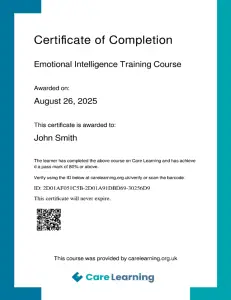Dissociation isn’t always the easiest concept to understand, yet it plays a major role in how some people respond to trauma. For individuals experiencing dissociative disorders, it can profoundly affect their daily lives, relationships, and how they interact with the world. This course offers a clear and practical understanding of dissociation, its underlying causes, and ways to provide effective support to people who use services.
Whether you’re looking to deepen your knowledge or gain practical strategies for supporting those living with dissociative disorders, this course is tailored to give you the tools, confidence, and understanding to make a difference. From trauma’s connection to dissociation, to treatments and ongoing recovery support, we focus on practical learning grounded in real-world care frameworks.
If you work in the care sector, this free course is designed specifically for you. You’ll develop a deep understanding of the challenges people face, and learn how to deliver compassionate, tailored care that truly helps those you support.
Why Take This eLearning Course?
Dissociative disorders can be misunderstood, even by those who work with people affected by them. These disorders often stem from trauma and are a way for someone to protect themselves from overwhelming distress. However, the symptoms – such as memory gaps or the feeling of being disconnected – can bring their own challenges for individuals trying to cope with them.
This free dissociative disorders course will give you a clear understanding of dissociation, its causes, and how it impacts people who use services. It provides practical information grounded in UK-based care practices, ensuring everything you learn is relevant to your role.
By taking this course, you can:
- Support individuals with empathy and understanding: Gain a deeper insight into what dissociation is and why it occurs. You’ll be better equipped to provide the right support that helps people feel safe and understood.
- Build your knowledge of dissociative disorders: Learn about the different types of dissociative disorders (like Dissociative Identity Disorder and Depersonalisation Disorder), their symptoms, and how they are diagnosed.
- Improve outcomes for people who use services: Dissociative disorders often bring parallel challenges to mental health, relationships, and daily life. By expanding your knowledge, you can play a key role in helping people manage these issues more effectively.
- Stay current on assessment and treatment approaches: The course covers tools, therapies, and strategies used in the UK today. From specific diagnostic tools like the SCID-D to trauma-informed therapies, everything you learn is practical and actionable.
- Address stigma and promote recovery: You’ll learn about the barriers people face when seeking help and how you can be part of their journey to recovery.
If you want to feel more prepared, informed, and confident in supporting people affected by dissociative disorders, this course is for you.
Learning Outcomes
By the end of this course, you’ll be able to:
- Understand what dissociation is, its main components, and how it functions as a response to distress.
- Recognise the signs of dissociation, including feelings of detachment or memory gaps, and their impact on daily life.
- Identify the different types of dissociative disorders, including how they are diagnosed under DSM-5 (Diagnostic and Statistical Manual of Mental Disorders) and ICD-11 (International Classification of Diseases).
- Understand the role of trauma – especially early trauma – in the development of dissociative disorders, along with other contributing factors like chronic stress or adverse experiences.
- Explore tools for assessing dissociative symptoms, including interview frameworks and non-verbal assessment techniques.
- Learn about available treatment approaches, including trauma-focused therapies, emotional stabilisation, and strategies to support emotional regulation.
- Develop skills for reducing stigma, improving safety in therapeutic settings, and building practical recovery strategies for those who dissociate.
- Take care of your own wellbeing when working with trauma survivors, including following strategies to manage secondary stress.
This course is focused on giving you knowledge you can apply in real-life settings to provide effective, empathetic care.
Target Audience
This course is tailored for professionals working in social care or community support roles. It’s suited for:
- Social care professionals, including carers and support workers.
- Practitioners who assist individuals with mental health challenges.
- Team leaders or managers looking to deepen their understanding of dissociative disorders.
- Anyone in the social care field who supports people experiencing trauma-related issues.
Whether you’re new to social care or have years of experience, this course is designed to give you practical advice and deepen your understanding of dissociative disorders.
FAQ
How long does the course take?
The course fits around your schedule. It offers around 2 hours of learning material that you can complete at your own pace.
Do I need prior knowledge about dissociative disorders?
No prior knowledge is required. The course starts with the basics before progressing to advanced topics.
Is the course based on UK standards?
Yes, this course is designed specifically for professionals in England, covering UK practices, regulations, and frameworks.
Will I receive a certificate?
Yes. Upon completion, you’ll get a certificate that recognises your achievement and understanding of dissociative disorders.
Can I apply this learning straight away?
Absolutely. This course provides practical information and strategies you can use in real-life care settings from day one.
What if I have questions while taking the course?
You’ll have access to our support team if you need help while completing the course.
Is this course CPD accredited?
No, it will be shortly.
This course is your opportunity to deepen your understanding, gain actionable tools, and improve the support you provide to people experiencing dissociative disorders. Sign up today and start making a difference.
You must log in and have started this course to submit a review.
Dissociative Disorders Training Course CPD Accredited and Government Funding
We’re working on getting this Dissociative Disorders Training Course CPD accredited, and any course that’s approved will be clearly labelled as CPD accredited on the site. Not every health and social care course has to be accredited to help you meet CQC expectations – what matters is that staff are competent, confident and properly trained for their roles under Regulation 18. Our courses are built to support those requirements, and because they’re not government funded there are no eligibility checks or ID needed – you can enrol and start learning straight away.



